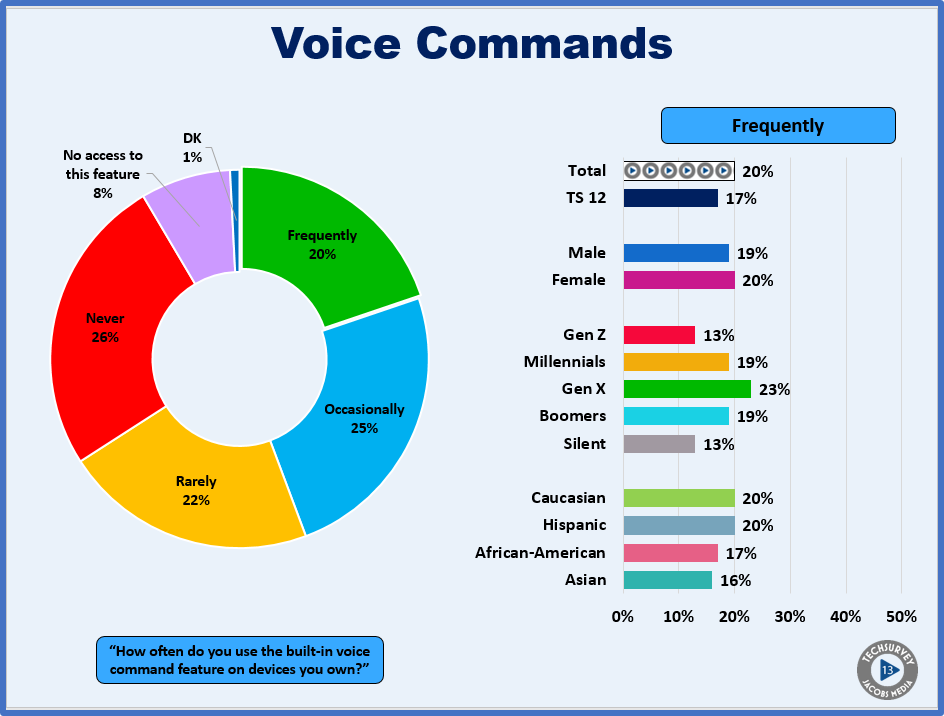
The crazy thing about the tech times in which we live is that new trends can seemingly pop up overnight.
Just ask Apple. While they’ve been fixated on phones, tablets, and watches, Amazon was in a different corner developing its new franchise – voice command devices, smart speakers, or better known as just “Alexa.”
We’re seeing this in a big way in our recently released Techsurvey13. Beyond asking about ownership of devices like the Echo and Google Home, we’re zooming in on behavior – the degree to which consumers are comfortable using any type of voice commands with the devices they own – phones, cars, and yes, smart speaker systems.
Nearly half (45%) of respondents use voice commands frequently and occasionally. And a deeper dive into frequent users – one-fifth of the total sample – reveals a rather uniform demographic pattern, punctuated only by Gen Xers, a group that is especially comfortable speaking to devices:

A story in Ars Technica by Nathan Mattise sheds more light on this burgeoning trend. Mattise covers the Collision 2017 tech conference that took place earlier this month in New Orleans. Not surprisingly, voice command devices were in the forefront.
A panel about this technology included Spotify’s Ian Geller, Pandora’s Geoff Snyder (and DASH alum), and Ben Shepherd whose title is Global Head of Alexa Music for Amazon. Talking about Alexa, specifically, both Snyder and Geller acknowledged the technology has moved from gimmickry to an integral part of connectivity.
Geller noted the industry has been waiting for “an iPhone moment for the connected home,” and devices like the Echo make it an eventuality. But his best observation was the notion that voice commands allow people to “engage with music in ways they haven’t since the Hi-Fi stereo system became possible.”
If you have any recollection of that movement that started in the ’50s and went totally mainstream a decade later, Hi-Fi systems transformed the world of home entertainment, allowing families across the spectrum to afford components and integrated systems that impressively elevated the presence of music in dens, rec rooms, kitchens, and eventually, the entire house.
Today, the smart speaker craze – led by the visionary Amazon, but attracting lots of competitive noise from Google, Microsoft, and soon Apple – will transform the ways in which we interact with media, entertainment, as well as security systems, appliances, and of course, our cars in our homes and offices.
As many of you know, Jacobs Media and jācapps are partnering with Amplifi Media’s Steve Goldstein to develop “smart skills” for these devices. This is a true moment for the radio industry – a chance to bring radio back to homes in a big way. Our new venture – SonicAi – is already working with both Amazon and Google to define needs and refine development efforts to better integrate the radio industry into this tech ecosphere. To say that both companies are enthusiastic collaborators is an understatement. They are ready, willing, and very able to provide help, guidance, and expertise – all good signs for a brighter future for the presence of radio in homes.
Of course, there will be some hiccups. You’ll note on the TS13 chart above that members of the Silent Generation – those born in 1946 or earlier – might struggle a bit with voice commands. Fortunately, Amazon is now partnering with AARP to better develop new technology to help seniors overcome some of their issues with Alexa. At least according to “Saturday Night Live.”
We talk a lot about the car, and its impact on radio – and for good reason. The lion’s share of radio listening takes place while consumers are in vehicles.
But part of the reason for this imbalance in radio listening locations is that the home has receded in importance over the past decade or more. Now voice command devices like the Amazon Echo and Google Home are jockeying for position to bring it back – powered by voice command technology that has the ability to change the way we bring technology and content into our lives.
It is not hard to visualize a near-term future where we simply ask Alexa (or Siri or Cortana) for whatever we want – and it will happen.
And we don’t even have to say “please” or “thank-you.”
See the Techsurvey13 Results
Want to see what else we learned in Techsurvey13?
- Media And Technology In 2025: Believe It Or Not! - April 18, 2025
- In Radio, You Just Never Know - April 17, 2025
- The Secret To Making A Great Podcast (And Great Radio) - April 16, 2025




Leave a Reply